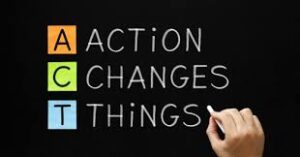Based on a web article by Scott Young
For most of us – other than the 2% of people who are really successful at what they do – there is a big challenge we face every day. We like to dream about what we want to become or what we want to have in the future but we can’t seem to take action. We have ideas but we can’t execute. As a human species, we are essentially lazy – we seek reward without working for it. So what is the solution? How does one get better at following up by taking action?

The answer lies in understanding that dreaming is one kind of activity and taking action is a completely different kind of activity. One does not necessarily lead to the other. Dreaming is pleasurable. Imagining who you may be able to become or the kinds of things you may be able to possess in the future can be exciting and fun. Taking action on the other hand can be a drag.
So the difference between these two activities is essentially enjoyment. We enjoy thinking about what can be much more than taking the necessary action. This is precisely what that small minority of very successful people have recognized and fixed. They have found a way to enjoy taking the action that generates their success. They have understood that movement towards their vision is what fuels their motivation and passion.
Now willpower and self-discipline – words we are all familiar with – have not really produced much of a difference in the past. This is because we did not enjoy taking the necessary action so the initiative was doomed even before it started.
An alternative strategy is to use the following three ideas:
1- Modify the activity so it becomes more enjoyable
This is the most important part: making the activity as exciting and enjoyable as possible. Some examples of this are working out with your friends, listening to music while jogging, etc.
2- Setup rewards and incentives for yourself
Allowing yourself to take some form of reward after a period of activity conditions the mind to start associating the activity with the reward. A common example of this is what is referred to as a “cheat day” during for example a diet. It is an opportunity to reward yourself for conforming to a certain activity routine and helps to strengthen continuation.
This act of rewarding oneself is particularly important in the early stages when it is too early to see real results. As the taking of action starts to produce the expected results, this becomes less necessary.
3- Modify the goal itself
Sometimes you may find the goal was not attractive enough or it was too ambitious and may never be realized. Rather than giving up, it is better to just change the goal itself so that it creates more motivation either because you have re-shaped it to become more desirable or more achievable.

Leave a Reply